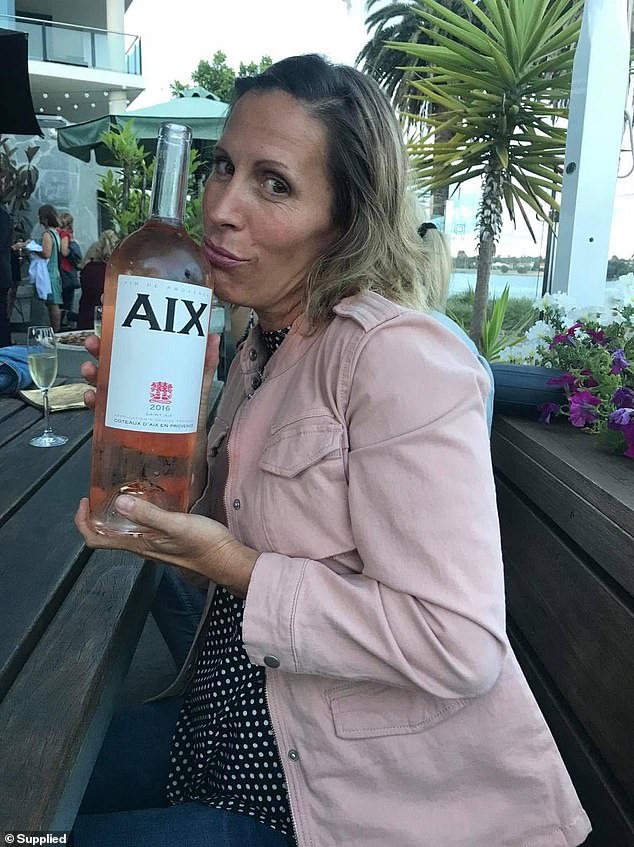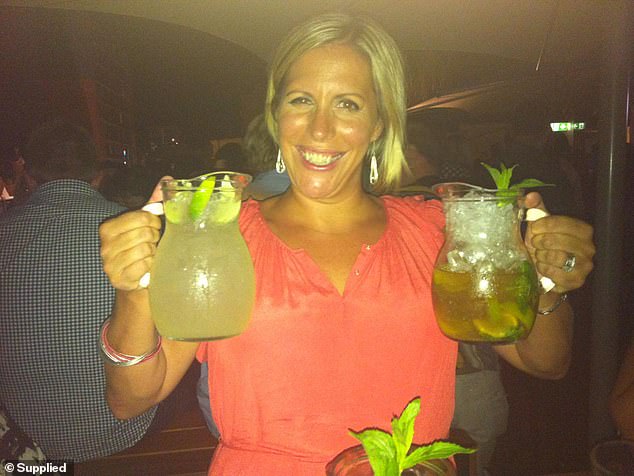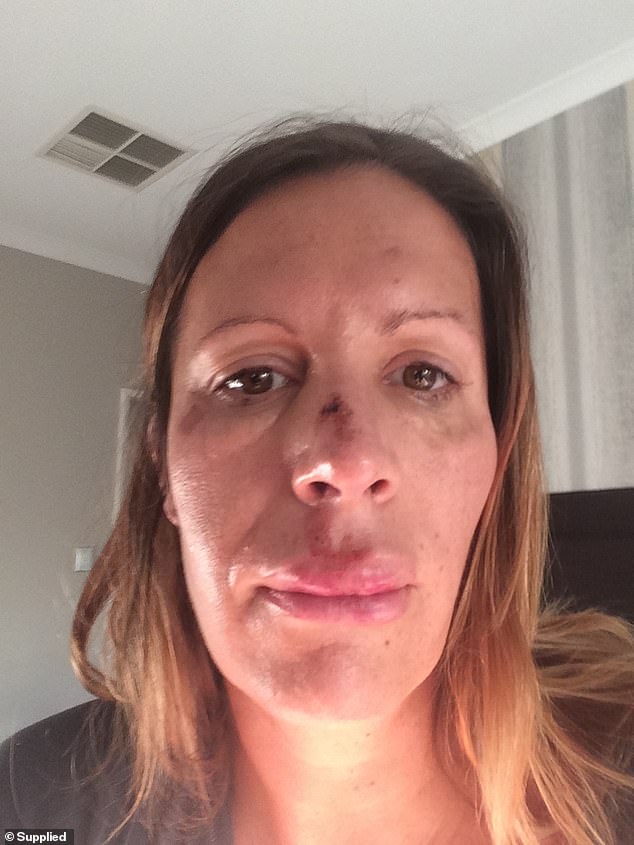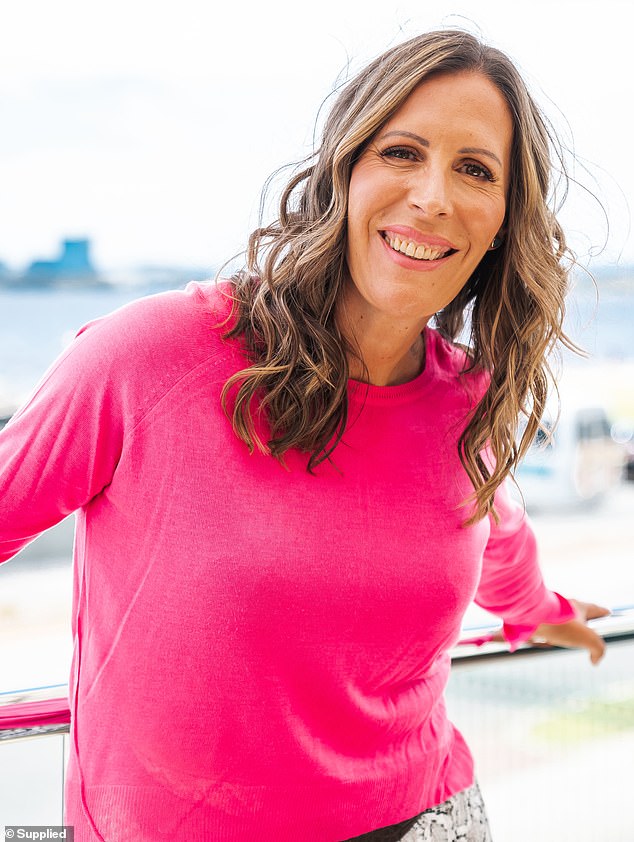Sarah popped a bottle of champagne to share with a friend while they got ready to attend a 40th birthday party.
Within an hour, they’d polished off the lot and were on their way.
At the party, drinks were flowing as waiters hurried around, refilling glasses. Sarah soon lost track of how many drinks she’d had.
Then, the night took an embarrassing turn.
‘I didn’t really eat and I went outside for a cigarette – I only smoked when I drank,’ Sarah tells me.
‘Because I was drunk, I crouched down to put out my cigarette, toppled forward and landed on my face on a concrete driveway.’
The drunken fall left Sarah with a bruised face and a split lip – and a profound feeling of shame.
‘I didn’t go to hospital. I went home and passed out,’ Sarah recalls.

Growing up in England, boozing was part of the culture and Sarah was known as a ‘party girl ‘

‘I didn’t drink to just enjoy one drink. I often drank to get drunk,’ says Sarah
The next morning, Sarah’s face was still ‘bruised, swollen and tender’ when her five-year-old daughter came in to check on her.
‘Mummy, what’s wrong with your face?’ she asked.
It was a mortifying wake-up call for Sarah.
‘I felt dread and anxiety in the pit of my stomach. I pretended I’d just had a silly accident and fallen over,’ she says.
‘I felt so utterly ashamed that I had fallen when drunk.
‘I hated myself for always being the one who drank more than others and made a fool of herself. Deep down I knew my relationship with alcohol wasn’t healthy.’
All her life, Sarah was known as the ‘party girl’.
Growing up in Manchester, in the north of England, booze was just part of the culture.
During her 20s, while at university, Sarah and her friends would regularly go out ‘with the intention of getting drunk’. After graduation, she moved to London for work.
‘I worked in recruitment in the 1990s with a real “work hard, play hard” culture. People knew me as being a “big drinker” but on the outside it didn’t really look like I had a problem,’ Sarah says.
‘I didn’t drink to just enjoy one drink. I often drank to get drunk.’
Still, she was very much ‘functioning’.
‘I’d get five or six hours of sleep after a night of drinking but thought nothing of it – it was the norm and what everyone did, so I never questioned it,’ she says.
After hitting the gym, she’d drink a kale smoothie, absolving – in her mind – the sins of the previous night. By evening, she’d be back in the pub again.
‘In London, no one has a car so we didn’t have to think “I’m driving tonight so I can’t drink”,’ she says.
This continued until Sarah took a year off to travel around Australia, where she met her now-husband Angus in 2002.
The couple wed in 2006, then moved to Perth in 2010, where they had their first child.
While Sarah didn’t drink while pregnant or breastfeeding, early motherhood changed her drinking habits entirely.
‘Drinking for me went from something I did to socialise to my reward at the end of the day,’ she admits.
‘I had always drunk with other people – never alone – but as a mother, I was home all day with no one else to talk to.’
As Australia wasn’t her home country, Sarah felt isolated and lonely, so began to use alcohol as a ‘way to switch off’ at the end of the day.
After welcoming her second child in 2011, her bad drinking habits continued.

At a friend’s 40th after a few too many drinks, Sarah was outside having a cigarette when she lost her balance and fell face first onto the concrete. She was left with a bruised face and split lip (pictured)

‘I’d get five or six hours of sleep after a night of drinking but thought nothing of it – it was the norm and what everyone did, so I never questioned it,’ Sarah (pictured since she quit booze) says
Sarah tried to set herself rules – like only having one glass in the evening – but she couldn’t stick to them, often polishing off the whole bottle in one sitting.
‘I still functioned, ran a business, looked after my kids and ran half marathons. I didn’t drink every day and I didn’t drink during the day.’
But the cracks were starting to show.
Sarah would wake at 3am with her heart racing and spend the entire day feeling anxious, only to find relief with her first drink that evening.
But it wasn’t until the disastrous fall at the 40th birthday party that Sarah really began to question her habits.
She decided to try a 21-day detox which she ended up extending to 100 days. ‘I felt absolutely amazing,’ she says.
‘I couldn’t believe the difference – I had more energy, I was motivated and sleeping better, I was happier and felt like a dark cloud had lifted from my head.
‘I thought I was fixed now and that I clearly didn’t have a problem.’
But unfortunately, within a few weeks of completing the challenge, she’d slipped back into old habits.
She spent the next two years trying – and failing – to moderate her drinking. Eventually, she decided to throw in the towel and quit altogether.
Sarah describes herself as a ‘grey-area drinker’ with ‘no off switch’, rather than an alcoholic. She insists she was not dependent on alcohol, but would drink too much.
After realising many other women fell into this category she’d identified for herself, she launched her own sobriety coaching business.
Now that her children are aged 13 and 15, she is teaching them about the dangers of alcohol and is proud to be an alcohol-free mother.
‘We talk about it a lot. I have told them why I don’t want them drinking too early and what alcohol does to their developing brain,’ she says.
‘They know that they can have fun without alcohol and that there are risks associated with alcohol. I didn’t know any of this information when I was their age so I’m glad they can make informed choices.’
Sarah has been sober since 2019 and hasn’t looked back.
‘My whole life has changed and my relationship with myself is completely different. I never used to have anything to help me with uncomfortable emotions and all I did was drink. I had no resilience,’ Sarah says.
‘I’ve learned I don’t need alcohol to have fun. I’ve grown in confidence and self-belief. I’m approaching 50 in the best physical and mental health I have ever been in and feel like I’m just getting started.’
Sarah Rusbatch has helped more than 10,000 women change their relationship with alcohol. To join her free community of like-minded women, click here.












